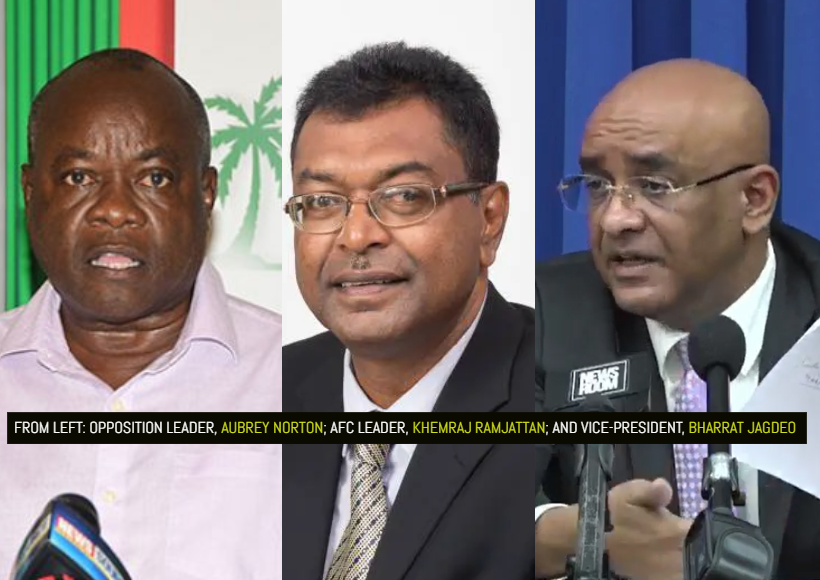While government and opposition parliamentarians are expected to make their contributions to the 2024 budget debate next week, Vice President, Dr. Bharrat Jagdeo has already ripped, to shreds, some of the arguments APNU+AFC members are likely to take to the floor of the National Assembly.
During a press engagement at Office of the President today, the Vice President tackled three of the main criticisms some opposition members shared with the media following the reading of the trillion dollar budget by Finance Minister, Dr. Ashni Singh.
Regarding the opposition’s criticism that the budget is heavy on capital expenditure with little measures for the ordinary man, Jagdeo said this reflects poor mental aptitude. He argued that there is a clear nexus between government’s infrastructural investments and its impact on the lives of the citizenry.
“We have nearly $100B for miscellaneous roads and urban roads…With this allocation, an average 2600 to 3000 community roads will be built. This is essential for many of these communities because they don’t have proper community infrastructure. So, what is the opposition talking about?” the vice president said.
Regarding power generation, Dr. Jagdeo said $80B has been set aside for the gas-to-energy project, which is poised to slash electricity costs by 50 percent while launching Guyana into an era of industrialization. Jagdeo said this allocation also represents 8 percent of the $1.146 trillion budget. Importantly, the vice president highlighted the cost savings of this project to Guyanese. “Over a 10 year period, Guyanese would have to spend $1B less on their bills, and over a 20-year period, the savings would be more than the cost of the entire project. That project will also allow us to export cooking gas and represent a significant lowering of costs in this regard for our people,” the official said.
Regarding the new Demerara River Bridge, which cost US$260 million, Vice President Jagdeo highlighted its potential for significant cost savings for the average person. He explained that with this bridge, each user could save approximately one productive hour daily. Considering that around 30,000 Guyanese are expected to use the bridge, and valuing each saved hour at $1,000, Jagdeo pointed out that this translates to a personal saving of $30,000 per individual. Over a year, for all 30,000 individuals, this amounts to billions in time savings, underscoring the bridge’s immense value in enhancing productivity and efficiency.
“So when the opposition is saying we are spending too much on infrastructure, it is because they have a philosophy of eat every cent today and forget about tomorrow. We cannot do that as a country. They find it hard to comprehend this kind of philosophy,” the former Head of State said.
PENSION
Vice President Jagdeo also criticized the opposition’s response to the $3,000 increase in Old Age Pension. He pointed out that although it seems small in comparison to other budget allocations, it is significant when viewed in the context of historical increases.
He highlighted that in 2014, the pension amount was $13,125. During the five years under the APNU+AFC government, it only increased to $20,500—an annual increase of approximately $1,475. Jagdeo said, “That is APNU’s track record.” He also pointed out that this modest increase coincided with the removal of subsidies on water and electricity, as well as increased taxes in various areas.
Upon the PPP/C’s assumption of office, the party’s promise was to double the Old Age Pension. Jagdeo noted that the government is making progress toward this goal, with the pension now at $36,000, adding that it will increase to $41,000 in 2025. He then criticized the opposition’s current concern for pensioners as disingenuous, given their previous actions: “…So what you see now from the APNU, they are the personification of crocodile tears…they now have a sudden concern for pensioners when they shamelessly removed the subsidies for them,” he stated.
EDUCATION
Jagdeo also addressed the opposition’s criticism of the $4B subvention that was set aside for the University of Guyana when $6B was allocated for the Guyana Sugar Corporation (GuySuCo). Jagdeo said the opposition, perhaps intentionally, is overlooking the cost of the imminent write-off of loans for students. In this regard, the vice president said the first phase of this process will cost about $18B.
Overall, Jagdeo said the government has maintained its upward investment in education with the support of Guyana’s oil revenues. He was reminded that in 2020, the budgetary allocation was $51.4 billion. For 2024, it is now $135B, representing 11.8 percent of the budget.
Taking the foregoing investments into consideration, Jagdeo urged the public to critically evaluate the opposition’s claims, asserting that their critiques already fail to recognize the budget’s strategic vision and its alignment with the country’s long-term prosperity.













